| SHADOWS ON THE WALL | REVIEWS | NEWS | FESTIVAL | AWARDS | Q&A | ABOUT | TALKBACK | |||||
 Shadows off the beaten path Shadows off the beaten pathIndies, foreign, docs and shorts...
On this page:
BELEN |
EDEN & CHARLIE |
VALLEY OF THE SHADOW OF DEATH
| |||||
| See also: SHADOWS FILM FESTIVAL | Last update 14.Nov.25 | |||||
|
Belén Review by Rich Cline |  MUST
MUST  SEE SEE
| |||||
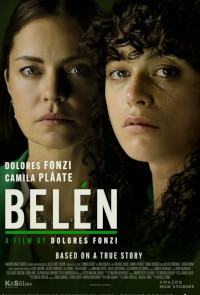 dir Dolores Fonzi scr Laura Paredes, Dolores Fonzi prd Hugo Sigman, Leticia Cristi, Matias Mosteirin with Dolores Fonzi, Camila Plaate, Laura Paredes, Julieta Cardinali, Sergio Prina, Luis Machin, Gaia Garibaldi, Cesar Troncoso, Lili release Arg 18.Sep.25, US/UK 7.Nov.25 25/Argentina MGM 1h45 Is it streaming? |
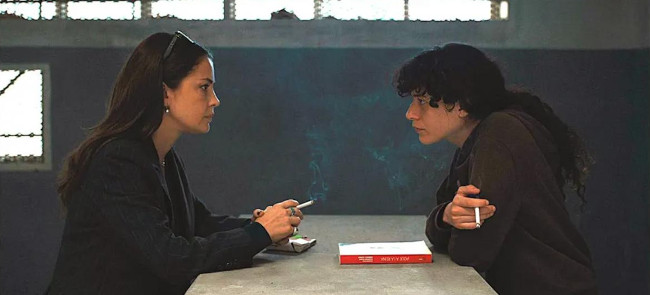 Opening with a breathtaking long take that follows a young woman through a harrowing hospital ordeal, actor-filmmaker Dolores Fonzi immediately gets the audience on the right side of this important true story from Argentina. What follows is unusually off-handed in the way it's written, directed and performed, blending real-life humour with political urgency to tell a moving story. It also highlights a thorny issue with refreshing universality. In the conservative community of Tucuman, Argentina, in 2014, 24-year-old Julieta (Plaate) arrives at an emergency room with sharp abdominal pains. After being callously manhandled by doctors, they learn that she has had a miscarriage. And the police treat her even more appallingly. Held in prison without bail, she waits two years for her trial, which is botched by her distracted public defender (Cardinali) in front of a thoughtlessly sexist judge (Machin). Horrified by this injustice, human rights lawyer Soledad (Fonzi) and her partner Barbara (Paredes) take on Julieta's case to file an appeal. Dramatised naturalistically, reminiscent of Ken Loach or Agnes Varda, the film homes in on the humanity rather than the issue. Because women are not taken seriously by the legal system, Julieta is ignored when she observes that the infant body found in the hospital could not have been hers. And her guilty verdict arrives without evidence or credible witnesses. To protect her from the press, Soledad renames her "Belen" to rally public support, leading to widespread protests about violent treatment of women by doctors, police officers and courts. The earthy storytelling allows actors to find remarkable nuance. Fonzi shines as the crusading Soledad, whose plucky team refuses to give up at each obstacle. And she also creates a compelling family life with Prina as her patient, supportive husband Diego, plus their two brightly involved children. Meanwhile, Plaate brings Julieta to life with an often astonishingly internalised performance. This young woman has been through some serious horrors, but refuses to back down. And she also rejects public accolades, preferring to remain anonymous. Indeed, the real Belen has never publicly revealed her identity, believing that it's more important for women to understand that this kind of thing could happen to anyone. So while the film grapples with abortion rights, that isn't actually the issue Belen has brought out into the daylight. Her landmark case marked the beginning of a shift in the justice system in Argentina. And the film recognises that there is still a long way to go.
| ||||
|
Éden & Charlie Review by Rich Cline | 
| |||||
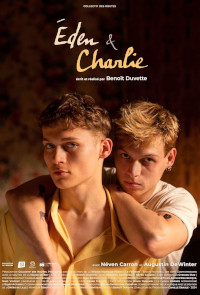 dir-scr Benoit Duvette prd Camille Graule with Augustin De Winter, Neven Carron release Fr 23.Oct.24, UK 3.Nov.25 24/France 46m Is it streaming? |
 Shot and edited in a warmly atmospheric style, this impressionistic French drama is bathed in soft colours and textures as it observes two teen boys exploring their identities. Writer-director Benoit Duvette creates unspoken yearning with evocative camerawork and a moody score by Jean-Christophe Cheneval. There's an intriguing timelessness to this short, artful film, mixing elements that are old world and present-day while creating imagery that is unusually tactile. In a large empty house, Charlie (Carron) is softly singing to himself when Eden (De Winter) arrives and begins snapping photos of the home's offbeat details. They speak awkwardly, and Charlie shows Eden some interesting things he has found. Eden wants to become a better photographer, but has never taken pictures of someone else. Charlie invites him to come back tomorrow to camp in a tent in the garden. So they continue to explore the house, discovering a secret room that hasn't been cleared out. And they continually watch each other, warily taking steps closer. Almost moving in slow motion, the film traces these two boys as they circle around each other, gradually opening up to each other as they begin to identify their feelings. Both De Winter and Carron have an easy physicality that seems to be confident, even as they feel insecure as outsiders. Both confess that others want them to be someone they're not, and that they usually feel like they're playing characters. With his mysterious bruises, Charlie seems to be harbouring other secrets. Then he discovers that Eden is hiding similar bruises. And surreal cutaways reveal more about them. Subtle and elusive, the film has an almost painterly feel with its dreamy pace and vivid visual textures, especially in the summery, twilight exterior scenes. The editing is a little jarring, frequently cutting away to charged scenes that seem to reveal the inner lives of these teens while celebrating their physical beauty. When an injured horse wanders into the house, Charlie makes the comparison to Eden's wounds and the need for healing. This is an intriguing look at the fragility of youth and the importance of finding like-minded people who can help us understand who we are.
| ||||
|
Valley of the Shadow of Death Review by Rich Cline | 
| |||||
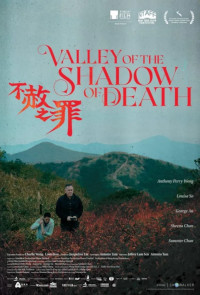 dir Jeffrey Lam Sen, Antonio Tam scr Antonio Tam prd Jacqueline Liu with Anthony Perry Wong, Louisa So, George Au, Sheena Chan, Summer Chan, Wing Mo, Choi Tsz Hin, Cheung Yan Amber, Tang Pui Nam, Lai Chi Ho, Pang Chun Hang, Chang Ka Man release HK 5.Jun.25, US Jul.25 nyaff, UK 14.Nov.25 24/China 1h24 Now streaming... |
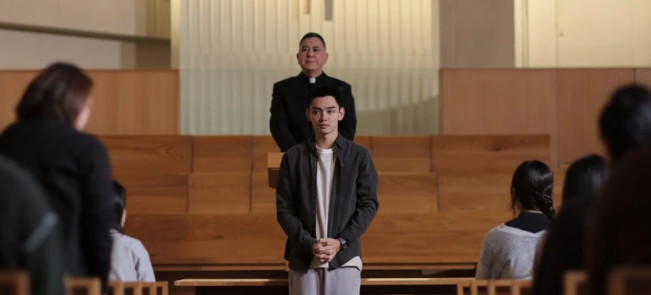 This faith-based drama from Hong Kong has an insistently serious tone, remaining quietly thoughtful while exploring the potent issues of grief, forgiveness and redemption. The understated script and direction get under the skin characters who are grappling with dark feelings that tilt the film towards horror. So while this feels a bit preachy with Christian theology, there are thought-provoking things going on within these multi-layered people. Pastor Paul (Wong) has a sense that his faith is about to be tested once again, three years after he and his nurse wife (So) lost their daughter Ching (Sheena Chan). Then he meets young ex-con Lok (Au), who is homeless after the death of his grandmother, a loyal church member. Paul challenges Lok to clean up his life by reading the Bible. But it turns out that Lok knew Ching. He's shocked to hear that she took her own life, knowing that God could never forgive him for his role in her death. Paul is still paralysed by grief, and his wife has lost her faith, furious that her husband is helping the boy who assaulted their daughter. Meanwhile, Lok is trying to make amends, grateful for help from the church, especially when he discovers that Paul is Ching's father. His troubled back-story with Ching emerges in extended flashbacks, considerably complicating the bigger picture. When these people work together to find a way through this situation, the film finds nuance both in their connections and in what they discover about themselves. Au plays Lok as a young guy who has a surprisingly generous spirit, which expresses itself in his timid kindness, cheerful camaraderie with children and helpful attitude toward those in need. Wong's stoic Paul tells Lok that to find peace he must repent of his sins and change his life. But his personal journey is much more difficult. And So is riveting as his single-minded wife. Paul believes it's normal for people to suffer, but there's a sense that he is wallowing in his own misery, while his wife expresses her anger much more overtly. As the narrative unfolds, the truth about this situation becomes increasingly textured, challenging our preconceptions. For these tortured souls, healing comes in helping other people who are in pain. The ultimate question is whether we can accept change in someone who has wronged us.
| ||||

See also: SHADOWS FILM FESTIVAL © 2025 by Rich Cline, Shadows
on the Wall
HOME | REVIEWS | NEWS | FESTIVAL | AWARDS
| Q&A | ABOUT | TALKBACK | | ||||

